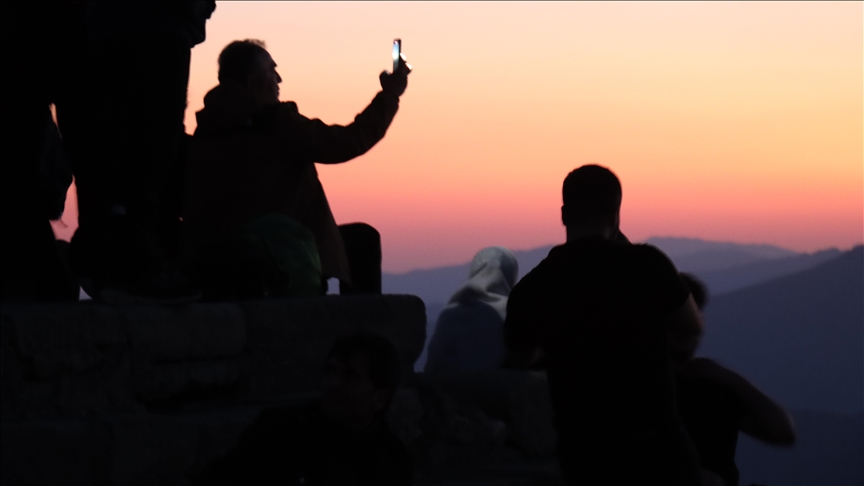Tourism rebounds beyond expectations but remains vulnerable to health threats: Industry officials
Top tourism officials call for stronger crisis management, collaboration to help stem impact of any possible health uncertainties

ANKARA
While global tourism bounces back stronger than expected, top tourism officials are urging continued vigilance and enhanced cooperation to safeguard the sector against emerging health threats such as mpox and possible future disruptions.
Speaking exclusively to Anadolu, Julia Simpson, head of the World Travel and Tourism Council (WTTC), said that the sector’s recovery post-COVID has not only met expectations but, in many instances, exceeded them.
"The global tourism sector is making a remarkable comeback," she said, citing the council’s own 2024 Economic Impact Research.
According to the report, the travel and tourism sector is expected see a $770 billion jump in contributions to world GDP, reaching $11.1 trillion in 2024 or nearly 10% of the global economy.
The sector is expected to support nearly 348 million jobs this year, up 13.6 million from 2019.
"These positive trends suggest a very strong outlook for the remainder of the year, indicating that the sector has not only met but, in many cases, exceeded the expectations set by the WTTC," she said.
Simpson highlighted key strategies that have prepared the sector for withstanding future shocks, such as forming "trust-based coalitions" with governments, tourism organizations, and local communities for coordinated responses to crises.
"Scenario-based planning, regular drills, and comprehensive emergency plans are also crucial," she sid.
Simpson pointed to the example of destinations like the US island state of Hawaii and New York City, which have both set up robust crisis management frameworks. Additionally, new technologies, such as Mexico’s "Guest Assist" mobile app, are providing crucial support to visitors during emergencies, she said.
While acknowledging the uncertainty around new health threats like the mpox virus, Simpson stressed that the industry learned valuable lessons from the 2020 COVID pandemic, including the importance of agility, communication, and flexibility.
Businesses that adapted quickly, such as by focusing on domestic tourism or embracing digital changes, proved to be more resilient, she said.
"Health and safety measures should be permanently integrated into operations," she noted, adding that both public and private sectors have a crucial role to play in creating a more resilient tourism industry.
"Governments, international organizations, and the private sector must work together to develop integrated strategies that support a robust and adaptable global tourism sector," Simpson said.
Mpox unlikely to cause COVID levels of disruption
Zurab Pololikashvili, the secretary-general of UN Tourism, the UN agency which promotes responsible, sustainable, and universally accessible tourism, echoed this call for heightened vigilance in the face of uncertainties in the public health care sector.
"Global tourism continues to bounce back strongly, with international arrivals reaching 97% of 2019 levels in the first quarter of 2024," Pololikashvili told Anadolu.
Pololikashvili acknowledged the uncertainty surrounding the current mpox virus but stressed that current trends suggest it will not have the same level of disruption as the coronavirus.
"Given the evolving nature of the situation, it is too early to evaluate any impact on tourism demand. UN Tourism is monitoring any trends that may be relevant and building on the experience during the COVID pandemic," he said, adding that coordination with the World Health Organization (WHO) remains crucial.
While some countries have introduced screening measures for international arrivals as a precaution, Pololikashvili reiterated that such decisions are the responsibility of national governments.
The UN Tourism chief noted that mpox is unlikely to reach the level of global disruption caused by COVID-19, and underscored the importance of vigilance and preparation.
"The COVID-19 pandemic highlighted the need for greater resilience in tourism," Pololikashvili said, adding that the UN Tourism agency is working closely with the World Health Organization (WHO), also a UN agency, to monitor the situation and adapt strategies accordingly.
Enhanced coordination, clear communication, and data-driven responses are central to these efforts, ensuring the sector remains ready to tackle future challenges, he stated.
Full recovery expected this year
Despite potential public health concerns, Pololikashvili projected a full recovery for the tourism sector in 2024, fueled by strong demand, improved air connectivity, and the continued recovery of China and other major Asian markets.
"This is in spite of the several challenges the sector currently faces, including economic and geopolitical headwinds as well as potential public health emergencies," he noted.
Simon Ralph, director of external affairs at the International Air Transport Association (IATA), underlined that virus has not had any noticeable effect on traveler numbers globally or in Africa.
"Mpox was a Public Health Emergency of International Concern (PHEIC) from July 2022 to May 2023 with no travel or trade restrictions," he said.
He noted that when the WHO reclassified mpox as a PHEIC on Aug. 14, it did not recommend any travel or trade restrictions, adding: "We should remember how ineffective travel and trade restrictions were during COVID."
"As long as governments follow WHO advice and do not impose travel restrictions, we do not expect the mpox virus to affect travel and tourism," he added.
Anadolu Agency website contains only a portion of the news stories offered to subscribers in the AA News Broadcasting System (HAS), and in summarized form. Please contact us for subscription options.



